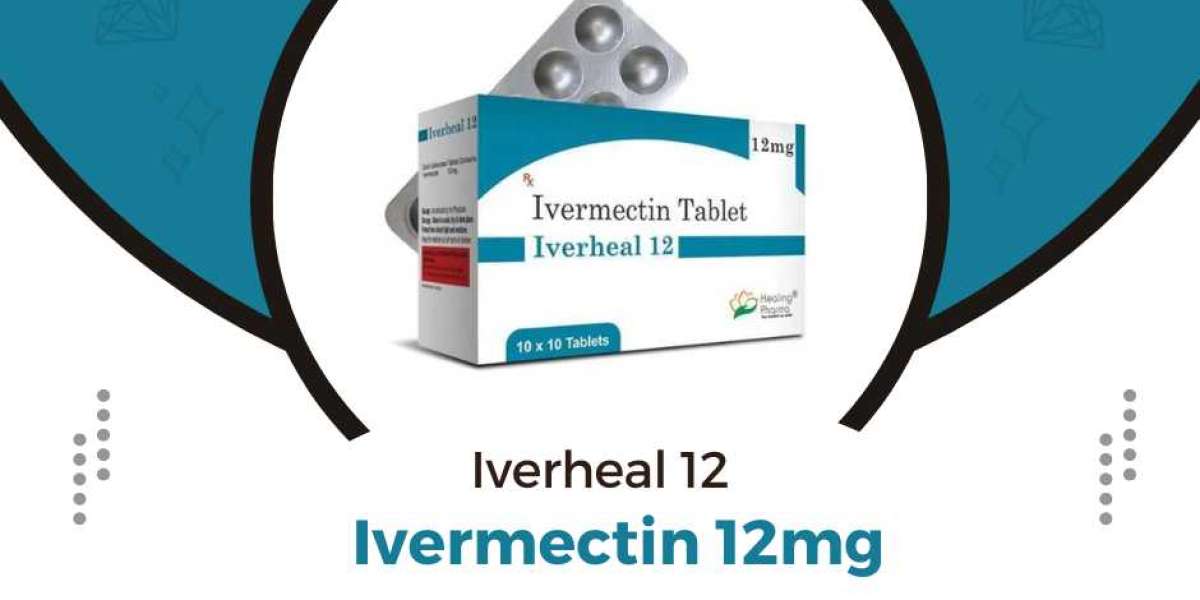What is Iverheal?
Iverheal 12 contains the active ingredient ivermectin, an antiparasitic agent used to treat a range of infections caused by parasites. Ivermectin works by paralyzing and killing the parasites, thereby stopping their growth and proliferation within the host's body. This medication is available in various forms, including tablets, creams, and lotions, making it suitable for both systemic and topical use.
How Does Iverheal Work?
Iverheal functions by binding to specific channels in the parasite's nerve and muscle cells. This binding increases the permeability of the cell membranes to chloride ions, resulting in hyperpolarization and subsequent paralysis of the parasite. Once paralyzed, the parasites are unable to survive and are eventually eliminated by the body's immune system.
Uses of Iverheal
Iverheal is used to treat several parasitic infections, including:
- Strongyloidiasis: An intestinal infection caused by the parasitic worm Strongyloides stercoralis.
- Onchocerciasis: Also known as river blindness, this infection is caused by the Onchocerca volvulus worm.
- Scabies: A skin infestation caused by the mite Sarcoptes scabiei.
- Pediculosis (Head Lice): Infestation of the scalp and hair by head lice.
- Lymphatic Filariasis: A tropical disease caused by filarial worms, leading to severe swelling and disability.
- Rosacea: A chronic skin condition that can benefit from ivermectin's anti-inflammatory properties when used topically.
Dosage and Administration
The dosage of Iverheal 6 varies depending on the type and severity of the infection. It is crucial to follow the prescribed dosage and instructions provided by a healthcare professional. Here are general guidelines:
- For Strongyloidiasis and Onchocerciasis: The typical dose is a single oral dose of 200 micrograms per kilogram of body weight.
- For Scabies: A single dose of 200 micrograms per kilogram, with a possible second dose after two weeks if needed.
- For Head Lice: Applied topically as a lotion, following the instructions for proper application and duration.
Potential Side Effects
Like all medications, Iverheal can cause side effects. While many people experience no or minor side effects, some may experience:
- Dizziness
- Nausea
- Diarrhea
- Fatigue
- Headache
- Muscle pain
In rare cases, severe allergic reactions can occur. Symptoms of a severe reaction include rash, itching, swelling, severe dizziness, and trouble breathing. If you experience any of these symptoms, seek medical attention immediately.
Precautions and Interactions
Before taking Iverheal, inform your healthcare provider of any allergies, medical history, and other medications or supplements you are currently taking. Certain medications may interact with ivermectin, potentially reducing its effectiveness or increasing the risk of side effects.
Pregnant or breastfeeding women should use Iverheal only if clearly needed and prescribed by a healthcare provider, as the effects on the unborn child or nursing infant are not fully known.
Conclusion
Iverheal is a potent and effective medication for treating a variety of parasitic infections. By understanding how it works, its uses, and potential side effects, patients can use this medication safely and effectively. Always consult with a healthcare professional before starting any new treatment to ensure it is appropriate for your specific condition.
For more information or to purchase Iverheal, consider consulting with your healthcare provider or visiting a reputable pharmacy.








